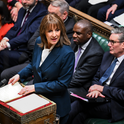The British public would prefer the UK to stay in the single market and customs union than do no deal on future relations with the EU. Some politicians might be talking tough, but that is not what their voters actually want.
This, at least, is the evidence from a new exercise in deepening democratic discussion: the Citizens’ Assembly on Brexit. Unlike most measures of public opinion, citizens’ assemblies explore what people want once they have had the chance to learn about the options and think them through in detail. They thus provide deeper insights into popular preferences than we are used to.
The Citizens’ Assembly on Brexit, which focussed on the different models for leaving the EU, was run by a consortium of academics and civil society organisations. It comprised 50 members of the public who were randomly selected with the help of polling company ICM to reflect the diverse make-up of the UK electorate in terms of gender, age, ethnicity, social class, where they live and—crucially—how they voted in the referendum last year. Thus, 25 of them voted Leave and 22 Remain, while three did not vote.
The members met over two weekends in Manchester earlier this autumn. They considered their own political priorities and those of their fellow participants, heard from and questioned experts with widely varying perspectives on the best way forward, and drew on balanced briefing papers that had been vetted by an Advisory Board of Leavers, Remainers, and non-aligned professionals. They then deliberated in depth among themselves, aided by independent facilitators who ensured that everyone’s voice was heard and respected.
Finally, they voted. Most members supported the kind of bespoke trade deal between the UK and the EU that the government is pursuing, maintaining free trade and avoiding the need for physical customs checks on the border. Should such a deal prove unattainable, however, substantial majorities preferred the UK to stay in the single market and customs union over leaving without a trade deal. This wasn’t the only surprise. On migration—in contrast to the general tenor of public debate—the majority wanted free movement of labour between the UK and the EU to continue. But they also wanted the UK to use its existing ability to limit the costs of immigration—such as by removing EU migrants who cannot sustain themselves financially, training British workers more effectively to avoid labour shortages, and boosting public services in areas where immigration is high.
“On migration, the majority wanted free movement of labour between the UK and the EU to continue"These conclusions deserve to be taken seriously. I saw for myself just how focused Assembly members were in thinking the questions through. They had to grapple with many complex issues—including non-tariff barriers, World Trade Organisation rules, and migrants’ entitlements to benefits—and took them in their stride. The members listened carefully to each other—even though at times they had starkly differing views—with great respect and good humour. In post-meeting surveys, almost every member agreed that the materials they had received had been fair and balanced and that their fellow participants had respected what they had to say, even when disagreeing. Their conclusions are based on considerable reflection and understanding.
It would have been good to have had more than two weekends to examine the issues in even greater depth. But this is still more time than most people (including, I fear, some politicians) have spent working through the details of Brexit. The Citizens’ Assembly offers a unique insight into informed public opinion on the current Brexit options.
Nowhere else can we see so clearly the views of regular citizens who have reflected on their own priorities and those of others, interrogated the arguments, and considered carefully the potential options. We can take from the Assembly that the public are not bursting to break free of EU shackles at all costs. They do not tend towards extreme positions. Rather, they want the government to act reasonably and with moderation and do all it can to protect the economy, jobs, and public services.
Read a summary report of the Citizens' Assembly here












